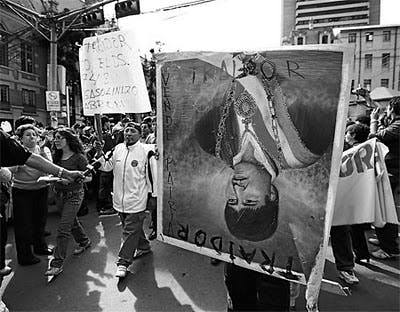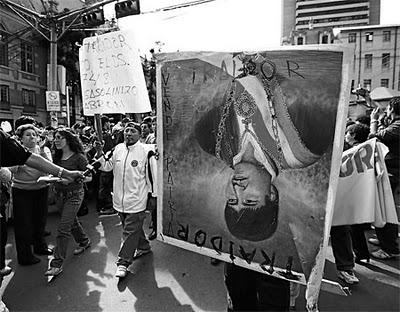El Enemigo En El Derecho
Jan 21, 2015
Story


¿Existe un “enemigo” en el derecho penal? En realidad, he escuchado hablar de víctimas, de delincuentes, de criminales, pero no de enemigos. Es que en el derecho penal normal, parece que no se contempla esta figura. Debe ser porque se supone que en un estado de derecho, existe un conjunto de leyes que protegen a las personas de quienes violan las leyes y les hacen daño.
Pero para Jakobs, cuando ese conjunto de leyes no se cumple, y el ciudadano se ve restringido cada vez con más fuerza en sus derechos, surge la posibilidad de que se esté utilizando el Derecho Penal del Enemigo. Para Manuel Cancio Meliá, este tratamiento del enemigo existe, pero no se debe legitimar llamándolo “derecho penal”, sino más bien se debe reconocer que este tipo de persecución existe solo en estados de excepción, es decir, en dictaduras.
Ambos tienen razón. La existencia del Derecho Penal del Enemigo queda al descubierto cuando vemos que sus características teóricas se corresponden exactamente con la realidad que vivimos en los países acosados por dictaduras socialistas que se empeñan en parecer democráticas. Veamos los tres elementos que caracterizan el Derecho Penal del Enemigo:
“El primero de ellos es que en las regulaciones que le son propias se verifica un marcado adelantamiento de la punibilidad. En este sentido corresponde destacar que en estas normas, el punto de referencia no es ya el hecho cometido, sino el hecho futuro.
En segundo lugar, las penas previstas son elevadas de modo desproporcionado con relación al hecho cometido. Como se advierte en el punto anterior, se trata de conductas lejanas al resultado lesivo tal como tradicionalmente lo concebimos, incluso ni siquiera implica la creación de un riesgo no permitido.
Y en tercer lugar existe una flexibilización de ciertas garantías del proceso penal que incluso pueden llegar a ser suprimidas” (Derecho Penal del Enemigo, Facundo J. Marin Fraga)
Es decir, que existe el derecho penal del ciudadano, y el derecho penal del enemigo, que se convierte en enemigo porque no se adhiere, no se conforma, no está de acuerdo, con la dictadura o la supresión del estado de derecho.
En el caso boliviano, está claro que en el caso terrorismo, por ejemplo, no se están juzgando hechos concretos como tal, sino “los hechos que podrían haber sucedido si no acababan con la célula terrorista”. Si se estuviera juzgando los hechos cometidos, las penas, en muchos casos, ya se hubieran cumplido. Pero el estado está ciego a esa realidad. Y en tercer lugar, el derecho al debido proceso de estos ciudadanos ha sido flexibilizado de tal forma en su contra, que nunca en la historia ha habido antecedente de una mayor criminalización de personas en nuestro país, sin tomar en cuenta los hechos que sucedieron, sino basados simplemente en “lo que podrían haber llegado a hacer”-
Está en manos de los juristas entendidos en estos temas, elevar una voz de protesta contra este tipo de utilización política de la justicia. Recordemos que son demasiadas familias sufriendo cárcel, exilio, y muerte civil, por demasiados años, sin ninguna garantía de que encuentren una real justicia en sus casos.
Los casos de Felipe Moza y Jose Vaca, el primero con más de cinco años de cárcel cuando su pena hubiera sido de cuatro años, y el segundo con cárcel domiciliaria, que no le permite salir ni siquiera a trabajar como se debe, y que ha tenido ya unas cien audiencias que no se realizaron, nos muestran el sufrimiento de ciudadanos que están lejos de ser criminales peligrosos. Son políticos opositores, nada más, ni nada menos. ¿Pagarán con sus vidas el haber caído en manos de la justicia en dictadura socialista? Esa es la pregunta que corroe y amarga el espíritu de todo ciudadano libre.
Los muertos dentro del uso y abuso del derecho penal del enemigo, nos traen al alma nombres como José María Bakovik, Guillermo Fortún, o Fernando Kieffer. Pero los propios socialistas no están libres de esta espada de Damocles. Los exilados, son más de 700. Sus familias, tienen que cubrir gastos de abogados, todos los días. Tienen que cuidarse de no caer muertos como ha ocurrido ya en anteriores ocasiones. Y el menor número de juicios que les han impuesto, es de 20. Veinte juicios! Ya no podemos seguir sin conversar sobre estos temas.
Comencemos pues. Reto a todo abogado nacional, y a todo ciudadano que tiene conocimiento sobre la violación de los Derechos Humanos que existe en nuestro país, a presentarlos en el siguiente evento: https://www.facebook.com/events/1503727846515454/?context=create&ref_das...
Este evento se llevará a cabo desde el 14 de mayo al 14 de junio del presente mes, en línea, y pueden participar todos y todas, dar sus opiniones al respecto, pero sobre todo compartir sus experiencias acerca de cómo se sienten al respecto, cómo les ha afectado, o cuales creen que deben ser los temas que vayan a tocarse en el primer seminario nacional que se va a realizar en junio de este año, respecto al uso del derecho penal del enemigo en nuestro país.
English translation by community member lmortiz
The Enemy in the Law
Does an “enemy” in the criminal law right exist? In reality, I have heard of talk about victims, about delinquents, about criminals, but not about enemies. It seems that in the normal criminal law, this figure is not even contemplated. It must be because in a law state supposedly, a group of laws exists that protect the people who violate the laws and harm them.
But for Jakobs, when that group of laws is not met, and the citizen is restricted each time with more power in their rights, the possibility that the Criminal Law for the Enemy surges is a possibility. For Manuel Cancio Meliá, this treatment of the enemy exists, but it should not be legitimized calling it “criminal law”, but rather it should be recognized that this type of persecution exists only in exception states, in other words, in dictatorships.
Both are right. The existence of the Enemy’s Criminal Law is exposed when we see that its theoretical characteristics correspond exactly with the reality that we live in the countries harassed by socialist dictatorships that insist in looking like democracies. Let’s look at the three elements that characterized the Enemy’s Criminal Law:
“The first of them is that in the regulations that are their own, a pronounced penalty advancement is verified. In this sense, it is worth noting that in these norms, the point of reference is not the committed act anymore, but the future act.
In second place, the anticipated penalties are elevated to a disproportionate level in relation with the committed act. As noted in the previous point, it is related to distant behaviors to the detrimental result such like it is traditionally conceived, it does not even imply the creation of a risk not allowed.
And in the third place a flexibility to certain warranties of the criminal process exists that can even become suppressed” (Criminal Law of the Enemy, Facundo J. Marin Fraga)
That is, that the criminal law of the citizen exists, and the criminal law of the enemy, who becomes the enemy because he/she does not adhere, is not satisfied, is not in agreement, with the dictatorship or the suppression of the state of the law.
In the Bolivian case, it is clear that in the terrorist case, for example, concrete facts are not been judged as so, but “the acts that could have occurred if they do not finish with the terrorist cell”. If the committed acts would be judged, the penalties, in many cases, have already been completed. But the state is blind to this reality. And in the third place, the right to due process of these citizens has been adapted in such a way against them, that never in the history have been an antecedent of a major criminalization of people in our country, without taking into consideration the committed acts, but based simply on “what could have end up happening”-
It is in the hands of the jurors knowledgeable of these topics, to raise a voice of protest against this type of political use of the justice. Let’s remember that it is too many families suffering in prison, exile, and civil death, for too many years, without any warranty that real justice will be found in their cases.
Felipe Moza and Jose Vaca cases, the first with more than five years in prison when his sentence should have been four years, and the second with domiciliary prison, who is not even allowed to leave to work as he should, and who has had about a hundred audiences that have not taken place, it shows us the suffering of citizens that are far from being dangerous criminals. They are political opponents, nothing more, nothing less. Will they pay with their lives to have fallen in the hands of the justice in a socialist dictatorship? That is the question that corrodes and bitters the spirit of all free citizens.
The dead within the use and misuse of the enemy’s criminal law brings to our soul names such as José María Bakovik, Guillermo Fortún, or Fernando Kieffer. But the own socialists are not free of this Damocles sword. The exiles are more than 700. Their families have to cover the lawyer expenses, every day. They have to be careful not to die as has happened in previous occasions. And the least number of juries that have been imposed to them is 20. Twenty juries! We cannot continue without talking about these topics.
Let’s start. I challenge all national lawyers, and all citizens that have knowledge of the violation of the Human Rights that exist in our country, to participate in the following event: https://www.facebook.com/events/1503727846515454/?context=create&ref_das...
This event will take place from May 14 to June 14 of the current month, online, and all can participate, give your opinion about it, but mainly share their experiences in regards to how they feel about it, how it has affected them, or which ones they believe should be the topics to be discussed at the first national seminar that will take place in June of this year, in regards to the use of the penal right of the enemy in our country.




